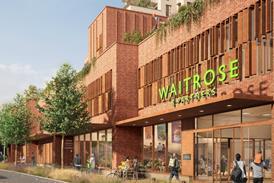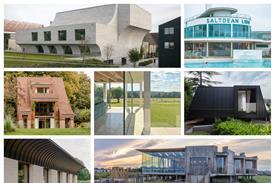- Home
 Said Khan signs off Hawkins Brown and East’s Oxford Street pedestrian plan with vehicles to be removed from September
Said Khan signs off Hawkins Brown and East’s Oxford Street pedestrian plan with vehicles to be removed from September What made this project… Majid Al Futtaim mosque by Kettle Collective
What made this project… Majid Al Futtaim mosque by Kettle Collective John Lewis pulls plug on build-to-rent business which had aimed to build 10,000 homes
John Lewis pulls plug on build-to-rent business which had aimed to build 10,000 homes ‘Incredibly diverse’ 2026 RIBA South East Awards shortlist unveiled
‘Incredibly diverse’ 2026 RIBA South East Awards shortlist unveiled
- Intelligence for Architects
- Subscribe
- Jobs
- Events

Events calendar Explore now 
Keep up to date
Find out more
- Programmes
- CPD
- More from navigation items
Will driverless cars change our cities for better or worse?

Do electric private-hire driverless cars represent a huge opportunity to redesign our urban environment?
Today’s revolution in controlled autonomous vehicles (CAV) combines advances in artificial intelligence and electric car technology with the disruptive hire model of firms like Uber. Though definitions of CAVs vary from a car controlled totally by computer to one with a level of automation enabling humans to drive more safely, on one thing all agree: CAV is set to transform how people, cars and the city interact.
The onset of CAVs has brought a flurry of excited predictions about how cities of the future might look. Google, a leading developer of CAV technology, has predicted that in the car-dominated US, driverless cars could release the country’s estimated 105 million parking spaces for new schools, hospitals, parks and housing with a combined size “bigger than Connecticut”.
“Driverless cars could remove the pedestrian defences conventionally required and open up the space for all manner of recreational pursuits”
David Rudlin, Urbed
…
This is premium content.
Only logged in subscribers have access to it.
Login or SUBSCRIBE to view this story

Existing subscriber? LOGIN
A subscription to Building Design will provide:
- Unlimited architecture news from around the UK
- Reviews of the latest buildings from all corners of the world
- Full access to all our online archives
- PLUS you will receive a digital copy of WA100 worth over £45.
Subscribe now for unlimited access.
Alternatively REGISTER for free access on selected stories and sign up for email alerts


